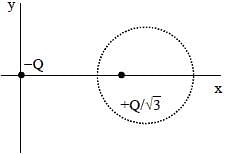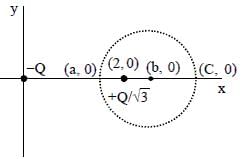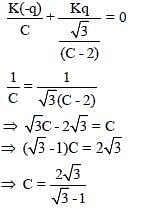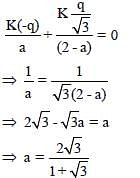JEE Exam > JEE Questions > Two point charges -Q and +Q/√3 are plac...
Start Learning for Free
Two point charges -Q and +Q/√3 are placed in the xy-plane at the origin (0, 0) and a point (2, 0), respectively, as shown in the figure. This results in an equipotential circle of radius R and potential V = 0 in the xy-plane with its centre at (b, 0). All lengths are measured in metres.

Q. The value of R is _______ metres.

Q. The value of R is _______ metres.
Correct answer is '1.73'. Can you explain this answer?
| FREE This question is part of | Download PDF Attempt this Test |
Most Upvoted Answer
Two point charges -Q and +Q/√3 are placed in the xy-plane at the...

Let's take two points (a, 0) and (C, 0) on equipotential circle.
Net potential at (C, 0) = 0

Net Potential at (a, 0) = 0

So, Radius
=

=

Radius = √3
= 1.73
Attention JEE Students!
To make sure you are not studying endlessly, EduRev has designed JEE study material, with Structured Courses, Videos, & Test Series. Plus get personalized analysis, doubt solving and improvement plans to achieve a great score in JEE.

|
Explore Courses for JEE exam
|

|
Similar JEE Doubts
Two point charges -Q and +Q/√3 are placed in the xy-plane at the origin (0, 0) and a point (2, 0), respectively, as shown in the figure. This results in an equipotential circle of radius R and potential V = 0 in the xy-plane with its centre at (b, 0). All lengths are measured in metres.Q.The value of R is _______ metres.Correct answer is '1.73'. Can you explain this answer?
Question Description
Two point charges -Q and +Q/√3 are placed in the xy-plane at the origin (0, 0) and a point (2, 0), respectively, as shown in the figure. This results in an equipotential circle of radius R and potential V = 0 in the xy-plane with its centre at (b, 0). All lengths are measured in metres.Q.The value of R is _______ metres.Correct answer is '1.73'. Can you explain this answer? for JEE 2024 is part of JEE preparation. The Question and answers have been prepared according to the JEE exam syllabus. Information about Two point charges -Q and +Q/√3 are placed in the xy-plane at the origin (0, 0) and a point (2, 0), respectively, as shown in the figure. This results in an equipotential circle of radius R and potential V = 0 in the xy-plane with its centre at (b, 0). All lengths are measured in metres.Q.The value of R is _______ metres.Correct answer is '1.73'. Can you explain this answer? covers all topics & solutions for JEE 2024 Exam. Find important definitions, questions, meanings, examples, exercises and tests below for Two point charges -Q and +Q/√3 are placed in the xy-plane at the origin (0, 0) and a point (2, 0), respectively, as shown in the figure. This results in an equipotential circle of radius R and potential V = 0 in the xy-plane with its centre at (b, 0). All lengths are measured in metres.Q.The value of R is _______ metres.Correct answer is '1.73'. Can you explain this answer?.
Two point charges -Q and +Q/√3 are placed in the xy-plane at the origin (0, 0) and a point (2, 0), respectively, as shown in the figure. This results in an equipotential circle of radius R and potential V = 0 in the xy-plane with its centre at (b, 0). All lengths are measured in metres.Q.The value of R is _______ metres.Correct answer is '1.73'. Can you explain this answer? for JEE 2024 is part of JEE preparation. The Question and answers have been prepared according to the JEE exam syllabus. Information about Two point charges -Q and +Q/√3 are placed in the xy-plane at the origin (0, 0) and a point (2, 0), respectively, as shown in the figure. This results in an equipotential circle of radius R and potential V = 0 in the xy-plane with its centre at (b, 0). All lengths are measured in metres.Q.The value of R is _______ metres.Correct answer is '1.73'. Can you explain this answer? covers all topics & solutions for JEE 2024 Exam. Find important definitions, questions, meanings, examples, exercises and tests below for Two point charges -Q and +Q/√3 are placed in the xy-plane at the origin (0, 0) and a point (2, 0), respectively, as shown in the figure. This results in an equipotential circle of radius R and potential V = 0 in the xy-plane with its centre at (b, 0). All lengths are measured in metres.Q.The value of R is _______ metres.Correct answer is '1.73'. Can you explain this answer?.
Solutions for Two point charges -Q and +Q/√3 are placed in the xy-plane at the origin (0, 0) and a point (2, 0), respectively, as shown in the figure. This results in an equipotential circle of radius R and potential V = 0 in the xy-plane with its centre at (b, 0). All lengths are measured in metres.Q.The value of R is _______ metres.Correct answer is '1.73'. Can you explain this answer? in English & in Hindi are available as part of our courses for JEE.
Download more important topics, notes, lectures and mock test series for JEE Exam by signing up for free.
Here you can find the meaning of Two point charges -Q and +Q/√3 are placed in the xy-plane at the origin (0, 0) and a point (2, 0), respectively, as shown in the figure. This results in an equipotential circle of radius R and potential V = 0 in the xy-plane with its centre at (b, 0). All lengths are measured in metres.Q.The value of R is _______ metres.Correct answer is '1.73'. Can you explain this answer? defined & explained in the simplest way possible. Besides giving the explanation of
Two point charges -Q and +Q/√3 are placed in the xy-plane at the origin (0, 0) and a point (2, 0), respectively, as shown in the figure. This results in an equipotential circle of radius R and potential V = 0 in the xy-plane with its centre at (b, 0). All lengths are measured in metres.Q.The value of R is _______ metres.Correct answer is '1.73'. Can you explain this answer?, a detailed solution for Two point charges -Q and +Q/√3 are placed in the xy-plane at the origin (0, 0) and a point (2, 0), respectively, as shown in the figure. This results in an equipotential circle of radius R and potential V = 0 in the xy-plane with its centre at (b, 0). All lengths are measured in metres.Q.The value of R is _______ metres.Correct answer is '1.73'. Can you explain this answer? has been provided alongside types of Two point charges -Q and +Q/√3 are placed in the xy-plane at the origin (0, 0) and a point (2, 0), respectively, as shown in the figure. This results in an equipotential circle of radius R and potential V = 0 in the xy-plane with its centre at (b, 0). All lengths are measured in metres.Q.The value of R is _______ metres.Correct answer is '1.73'. Can you explain this answer? theory, EduRev gives you an
ample number of questions to practice Two point charges -Q and +Q/√3 are placed in the xy-plane at the origin (0, 0) and a point (2, 0), respectively, as shown in the figure. This results in an equipotential circle of radius R and potential V = 0 in the xy-plane with its centre at (b, 0). All lengths are measured in metres.Q.The value of R is _______ metres.Correct answer is '1.73'. Can you explain this answer? tests, examples and also practice JEE tests.

|
Explore Courses for JEE exam
|

|
Suggested Free Tests
Signup for Free!
Signup to see your scores go up within 7 days! Learn & Practice with 1000+ FREE Notes, Videos & Tests.
























